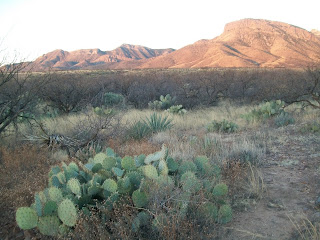When we arrived at the campgrounds we found a dry desert landscape. Even though the elevation is close to 4600 feet it was not much different than what you would see at my house at 3000. I guess the winter storms tend to track north of there. Up in Central and Northern AZ at 4600 feet you would see some juniper and occasional pinion pine but not down south. It was all mesquite trees, prickley pear and barrel cactus, some yuccas, with some ocotillo thrown in for variety.
At the camp ground the scenery is dominated by views of the Whetstone Mountains a ridge of mountains that rises up to close to 8000 feet in elevation. There are two hiking trails that leave the campgrounds and go up into the hills and mountains. One is a loop trail that climbs the foot hills and returns, the other is an out and back that goes well up into the forest service land of the mountain range.
The main draw of Kartchner Caverns State Park is of course the caverns themselves. The caverns were discovered by two college students back in 1974 and they kept it a secret for 14 years until they could get it protected by the owners of the land and the State Park Service. The caverns are named after the owners of the land that the caves were found on.
The State Park Service has gone to great lengths to keep the cave as well preserved as possible. This includes keeping the moist environment stable and free of outside air and dirt. They control the amount of light and no cameras are allowed in the caverns. So all the photos of the interior of the cave I had to find online. You go through a series of sealed doors as you descend down tunnels to the cave entrance. Once inside you find an amazing display of formations that are still being formed.
The paths are controlled to keep dirt from contaminating the cave and more than 85 percent of the cave has never been walked on. When you compare the glistening wet formations of this cave to ones you see at other places that are all dried out, there is no comparison. Not only is it well preserved but it is world class. containing some rare and in some cases best formations (speleothems) of calcite in the world. They say it has the 2nd longest recorded example of a soda straw formation. Soda straws are very thin formations that hang down from the ceiling. Along with that it has one of the largest columns (Kubla Kahn) in North America. And amazing flowstones, shields (including parachute, welt, and turnip types), and draperies to go along with all the stalactites, and stalagmites (including totems and fried eggs), cave popcorn, helectites, and boxwork.
One of my favorite formations was called cave bacon. I guess it is formed when water comes through a crack in the cave ceiling and with time makes a thin sheet of minerals the length of the crack. It really does look like bacon.
One of my favorite formations was called cave bacon. I guess it is formed when water comes through a crack in the cave ceiling and with time makes a thin sheet of minerals the length of the crack. It really does look like bacon.
There are two different tours of the caverns that you can take that take you to two different parts of the caves. Both of them are outstanding and I would advise you to do take both tours if you can.
The visitors center is called the Discovery Center because along with being the place you pick up your reserved tickets or purchase the "walk-up" tickets, and catch the tram up to the cave entrance, there are many informative displays and exhibits about the history, formation, and discovery of the caverns. The campgrounds have nice showers and bathrooms, and each site has water and electric. Most of the campers were in large recreational vehicles, basically houses on wheels. I'm more of the tent kind of guy myself.
Here is Holly our fierce guard dog on duty keeping watch over the camp making sure everything is in order.
If you are planing a trip there I recommend reserving tour tickets in advance, because only five per tour are saved for walk-up purchase. For more information about prices and reservations here is the State Park website. http://azstateparks.com/Parks/KACA/index.html









